Yesterday, the Assembly Environment and Solid Waste Committee approved the follow-up Concurrent Resolution ACR 160 (McKeon/Spencer) to veto the Christie DEP’s proposed rollbacks of flood hazard, coastal, and storm water management rules, most critically the weakenings and repeal of the 300 foot buffers along Category One “exceptional value” waters.
The Committee began the 2 step process required by the Constitution to veto Executive Agency regulations as inconsistent with legislative intent. The Senate versions SCR 66 (Lesniak) is up in the Senate Environment Committee on Monday.
The first step was taken at the end of last session, when both the full Assembly and Senate passed Resolutions.
As I predicted, in another remarkable and arrogant abuse of Executive power, the Christie DEP simply ignored those Resolutions and the Constitutional procedure, and failed to respond to the Legislature.
I can not understand how Republicans in the Legislature can continue to defend this intolerable abuse of power, regardless of how they feel about the policy debate over the DEP rules.
NJ Spotlight, as usual is the only game in town and is on top of it with a good story today, see:
I’ll make just one brief comment in response to this predictable wrongheaded quote by the NJ Builders Association:
Probably the most pressing concern among opponents to the rule is provisions they argue would eliminate buffer protections along streams and other waterways, steps that would lead to more pollution and increase the likelihood of flooding.
Supporters of the rule disputed that view. “What DEP has done is balance environmental protection with economic growth,’’ said Dwight Pittenger, a vice president of the New Jersey Builders Association.
First of all, the NJ Builders Association inadvertently has confirmed our strongest criticism of the DEP proposal – which DEP has vehemently denied – that it weakens protections and allows more development in the most environmentally sensitive and hazardous locations: in floodways, coastal storm and flood hazard zones, and in the buffers of high quality “exceptional” C1 waters.
Second, the NJBA’s concept of “balance” is absurd – even from a purely economic standpoint, the costs and risks of just flooding (inland and coastal) are enormous and those risks are growing as a result of climate change.
This kind of poorly planned and weakly regulated development has cost NJ’s economy and taxpayers billions of dollars – damage from Sandy alone exceeded $35 billion.
Those costs dwarf the tiny economic gains that would result from more reckless overdevelopment in the wrong places.
There are additional costs associated with the additional water pollution that need to be considered.
Finally, many studies show that natural vegetated stream buffers and regulatory protections increase property value, see page 45-46 and table of this DEP economic analysis for studies that quantify these economic benefits.
Readers need to:
1) reach out and thank McKeon & Spencer and ask Assembly Speaker Prieto to post ACR 160 for a vote; and
2) the Senate version is up on Monday moving – Contact Senator Lesniak, Chairman Smith, and Senate President Sweeney to support SCR 66. .


Pingback: WolfeNotes.com » Senate Committee Blinks In Veto of Christie DEP Clean Water Rule Rollbacks
Pingback: WolfeNotes.com » Stories and Photos From 2016 – Part 1 (of 4)